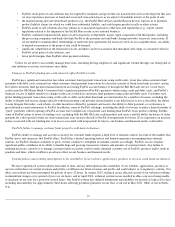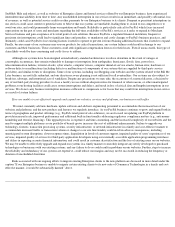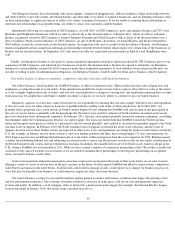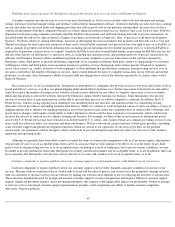eBay 2013 Annual Report Download - page 37
Download and view the complete annual report
Please find page 37 of the 2013 eBay annual report below. You can navigate through the pages in the report by either clicking on the pages listed below, or by using the keyword search tool below to find specific information within the annual report.
and the additional costs associated with complex use tax collection, remittance and audit requirements would make selling on our websites and
mobile platforms less attractive for small business retailers, and would harm our business.
The State of Colorado has enacted legislation that takes a different approach by imposing a set of use tax notice and reporting requirements
(but not the actual tax collection responsibility) on certain retailers with no physical presence in Colorado. The law is designed to aid Colorado
in collecting use tax from Colorado residents who purchase taxable items from out-of-state retailers. The regulation promulgated by the
Colorado Department of Revenue excludes from these reporting obligations businesses that sell $100,000 or less into the state in a calendar year,
thus limiting the impact on our sellers. The law has been challenged in Federal Court by a number of out-of-state retailers and a Federal District
Court has issued an injunction blocking enforcement of the regulations pending a resolution of the case. In March 2012, a federal judge struck
down the Colorado law as unconstitutional, finding that it discriminated against interstate commerce. Oklahoma has enacted a similar law but
has not taken any published enforcement action to date. While the application of these new state laws to our Marketplaces business has limited
direct impact, the proliferation of such state legislation to expand sales and use tax collection on Internet sales, could adversely affect some of
our sellers and indirectly harm our business.
In conjunction with the Streamlined Sales Tax Project - an ongoing, multi-year effort by U.S. state and local governments to require
collection and remittance of remote sales tax by out-of-state sellers - U.S. Senate and U.S. House versions of the Marketplace Fairness Act (S.
336 and H.R. 684) were introduced in the 113th Congress in 2013. The U.S. Senate passed S. 336 on May 6, 2013 with bipartisan support and
H.R. 684 has been referred to the House Judiciary Committee for review. If enacted into law, these measures would allow states that meet certain
simplification and other standards to require out-of-state sellers to collect and remit sales taxes on goods purchased by in-state residents. It is
expected that some sellers, meeting an as yet undefined small seller exception, would be excluded from the requirements of the Act. The
adoption of remote sales tax collection legislation that lacks a robust small business exemption would result in the imposition of sales taxes and
additional costs associated with complex sales tax collection, remittance and audit compliance requirements on many of our sellers. This would
make selling online less attractive for small retailers, and would likely harm our business.
From time to time, some taxing authorities have notified us that they believe we owe them certain taxes. In May 2008, the City of Chicago
notified both eBay and StubHub that they are liable for a city amusement tax on tickets to events in Chicago, irrespective of the location of the
buyer or seller, and filed suit to enforce collection of taxes it claims are due. In a series of rulings issued in 2009, the court ruled that StubHub is
not required to collect and remit the city amusement tax, entered a final order dismissing the case against StubHub, and dismissed the case
against eBay. The City of Chicago appealed both matters to the Seventh Circuit Court of Appeals, which subsequently certified the state law
arguments to the Illinois State Supreme Court. In October 2011, the Illinois Supreme Court ruled that state municipalities may not require
electronic intermediaries such as StubHub to collect and remit amusement taxes on resold tickets. That decision is now final. The application of
similar existing or future laws, including the imposition of similar taxes by taxing authorities, could adversely affect our business.
Several proposals have been made at the U.S. state and local levels that would impose additional taxes on the sale of goods and services
over the Internet. These proposals, if adopted, could substantially impair the growth of ecommerce and our brands, and could diminish our
opportunity to derive financial benefit from our activities. The U.S. federal government's moratorium on state and local taxation of Internet
access or multiple or discriminatory taxes on ecommerce has been extended through November 2014. This moratorium does not prohibit federal,
state, or local authorities from collecting taxes on our income or from collecting certain taxes that were in effect prior to the enactment of the
moratorium and/or one of its extensions.
Similar issues exist outside of the U.S., where the application of VAT or other indirect taxes on ecommerce providers such as eBay is
uncertain and evolving. While we attempt to comply in those jurisdictions where it is clear that a tax is due, certain of our subsidiaries have,
from time to time, received claims relating to the applicability of indirect taxes to our fees. In April 2012, we received Notices of Reassessments
for tax years 2001-2005 from the Canadian Revenue Agency (CRA) which assert goods and service tax (GST) and harmonized sales tax (HST)
on our fees charged to Canadian users. These reassessments of GST/HST were the result of an audit of eBay International AG and are based on
the CRA's assertion that we were “doing business” in Canada for GST/HST purposes. We disagreed with the reassessments and filed a Notice of
Appeal with the Tax Court of Canada in July 2012. The CRA asked us to settle this matter with no tax due and in June 2013 we received
reassessments showing that no tax was due. Should such taxes become applicable, our business could be harmed. We collect and remit indirect
taxes in certain jurisdictions. However, tax authorities may raise questions about our obligation to collect and remit such taxes, as well as the
proper calculation of such taxes. For example, the Korean tax authority asserted that certain coupons and incentives available on our sites should
not be deducted when computing taxes on our fees. We challenged these assessments and in June 2012, the National Tax Tribunal issued a final
ruling in our favor with respect to item incentives from June 2006 onward. The assessments on item incentives up to May 2006 and coupons up
to June 2010 are being reviewed by the Korea Supreme Court following two lower courts' rulings in our favor in January and November 2013,
respectively.
35
























